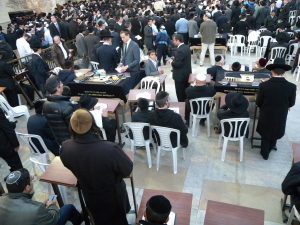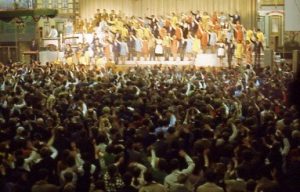Covenant Love Written on Our Hearts
(Jeremiah 31:31-34; Ps 51; Hebrew 5:7-9; John 12:20-23)
******************************************************
A couple was celebrating their 60th wedding anniversary. When someone asked the husband about the secret to their successful marriage, he replied when they got married, they agreed that he would make all the major decisions, his wife would make all the minor decisions, and in 60 years of marriage, they never had to make any major decisions!
The readings today remind us of our intimate covenant relationship with God and our call to live the law of love from the heart.
Verses 31-34 in the first reading from Jeremiah chapter 31 is an important text that speaks of a new covenant God will make with God’s people, with God’s law written on our hearts.
A covenant is much more than an agreement or a contract. It is more like a pledge of mutual love in a marriage. God has always wanted an intimate covenant relationship with God’s people and entered into many covenants throughout our salvation history: with Adam and Eve, a couple; with Noah, a family; with Abraham, a whole tribe; and with Moses, a whole nation.
All these covenants were conditional – keep the law and they would be blessed; break the law and they would be cursed, and we know they never really worked. The Chosen people given the ten dabar, the Ten Commandment way to live, were to be an icon of God here on earth, drawing all the nations back to the one true God. However, the people were always unfaithful to this covenant relationship in their lust for possessions, fame and power.
With David, God did something different. God promised to be faithful to David no matter what he did, and what did David do? Lust, adultery and arrange a murder – rather serious offences. But when confronted by the prophet Nathan, David repented sincerely, and experienced God’s unconditional love as pure forgiveness. That experience transformed David into the one true King that Israel ever had, and a forerunner of Jesus. So much so that Jesus is referred to in the scriptures as Son of David, born in the City of David, of the lineage of David, and never as Son of Moses or of Elijah.
That history was all preparation for the truly new covenant Jeremiah spoke of and that the gospel alludes to – the life-giving covenant in Jesus Christ. When the Greeks finally want to see Jesus, they represent the gentile world coming to believe in him. That is a signal for Jesus that his “hour” had come – the hour mentioned during the temptation in the desert and at the wedding feast at Cana. It was the hour for him to be glorified. God speaks from the heavens, blessing him and assuring him that he would be glorified. Jesus then proclaims that when he is lifted up from the earth, he will draw all people to himself. This new covenant would come about, however, through his passion, death and resurrection – the final and greatest demonstration of God’s unconditional love for the whole human race.

Studying the Torah at the Western Wall in Jerusalem pn the Sabbath
Jesus is the Word made flesh, the new Torah, and ultimately, the law made flesh. The new covenant would be established through his flesh and blood shed on the cross that would lead to his resurrection. When we consume his body and blood, we are consuming this new covenant, the Torah, the law. We are being made Christ-like. The law is within us, written on our hearts. We must now simply live out that law of love that we have consumed.
We can compare this to an athlete who practices the same action over and over again until he or she masters it, then they can perform it flawlessly, because the moves are already ingrained in their bodies. With the law of love written on our hearts, we can “love and do what we will” as St. Augustine put it, because when we love we will want to do only the will of God. Along that same line, St. Augustine used to say to the newly baptized, “Receive who you are” when giving them communion.
Meg, the main character in the movie A Wrinkle in Time, can serve as a metaphor for us. After her father disappears into outer space, she is left stuck in grief, loses her self-esteem, becomes the victim of bullying at school, and wants to be someone else. However, when she is blessed by the wisdom figures in the movie, she begins to believe in herself and how loved she is. When confronted by evil, with this new inner confidence, she is able to stand strong, love herself by admitting and accepting her faults, love her brother who is attacking her, overcome the evil force and rescue her father. Her new, inner strength made her a warrior for the light.
I experienced a little of this law written on the heart when I joined the international singing group Up With People as a university student. As I was discerning a vocation to priesthood at the time, I decided that I would not drink, smoke or date while travelling with the group. When I joined the group in Santa Fe, New Mexico, I discovered they had three rules: no drinking, smoking or dating! I quietly chuckled to myself that I didn’t need these rules because I already had them “written on my heart” and understood more clearly what Jeremiah meant by those words.

Final song of an UWP performance
The Eucharist is a celebration of that new covenant with the Father based on the sacrifice of Jesus on the cross. That was his hour of glory, freely chosen out of his intimate relationship with the Father and inner law of love for the world.
May our celebration deepen our covenant relationship with the Father through the body and blood of Jesus we have received. May it empower us to live out the law of love written on our hearts.




Whenever we celebrate mass we are ready to receive this covenant through the body and blood of Chrsit through the Eucharist. This is already deepening our faith with God and Jesus Christ because some people do not believe in this. The New Covenant also represents love and intimate relationship with the Lord and Jesus Christ . We should deepen our faith with Jesus Christ when we receive the Eucharist through mass. I only receive the body of Christ at the Church on Sunday masses , there is no blood of Christ being distributed to people. Our priest is the only one drinking the wine, this is available during special feast days like the Last Supper and Passion Sunday and Passion week. Thanks be to God . Amen
Thanks again Bishop with the heart warming message and homily on receiving the Covenant of Christ. I was looking at other readings for today, we were not talking about this. Thank you Thank you Bishop
Your homilies are meaningful and full of advices.